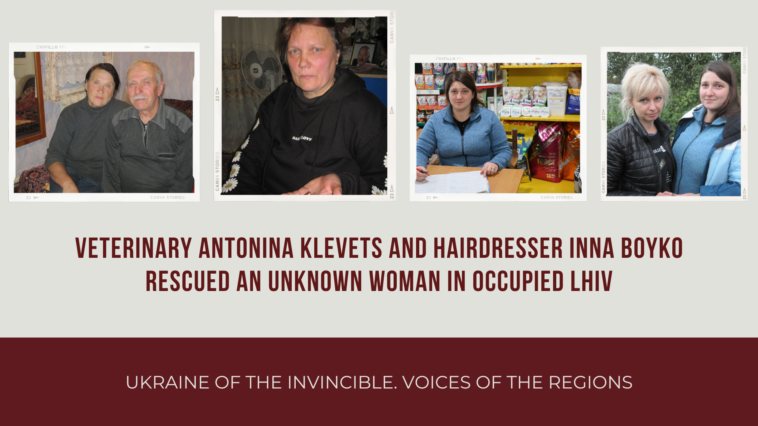“Medics are working on the verge of heroism. Even during an air alarm, they do not stop working. Some cannot go home after three actions. They all help each other. They team up and are very concerned. They understand that it’s a stressful situation, and both kids and moms feel uncomfortable down there. They try to create some comfort and take furniture, blankets, and baby cots with heating pads there. After all, we spend most of our time in the bomb shelter. We are allowed to go up to the wards for a few hours,” – that’s how one of the interviewees described the situation in the maternity hospital on the third day of the invasion.
For the tenth month, Ukrainian medics stand side by side with soldiers and civilians in the war zone. There are never enough of them in war. In such cases, they are helped by those for whom humanity is an elixir against all diseases.
THE ROAD OF LIFE BECAME THE ROAD OF DEATH
An incredible story of rescuing Antonina Skreka from Kuvechychi, Chernihiv district, sounds like a legend. On March 7, Russian soldiers brought a wounded, bloodied and unconscious woman to the occupied village of Lhiv. The stranger was sheltered by a couple of pensioners, and neighbors Antonina Klevets and Inna Boyko, who were far from medicine, saved her from probable death. Tonia, a vet by profession, operated without anesthesia, with tools she had previously used to save only animals, and pulled a bullet out of a wound with her bare hands. Inna, a hairdresser, acted as an assistant.
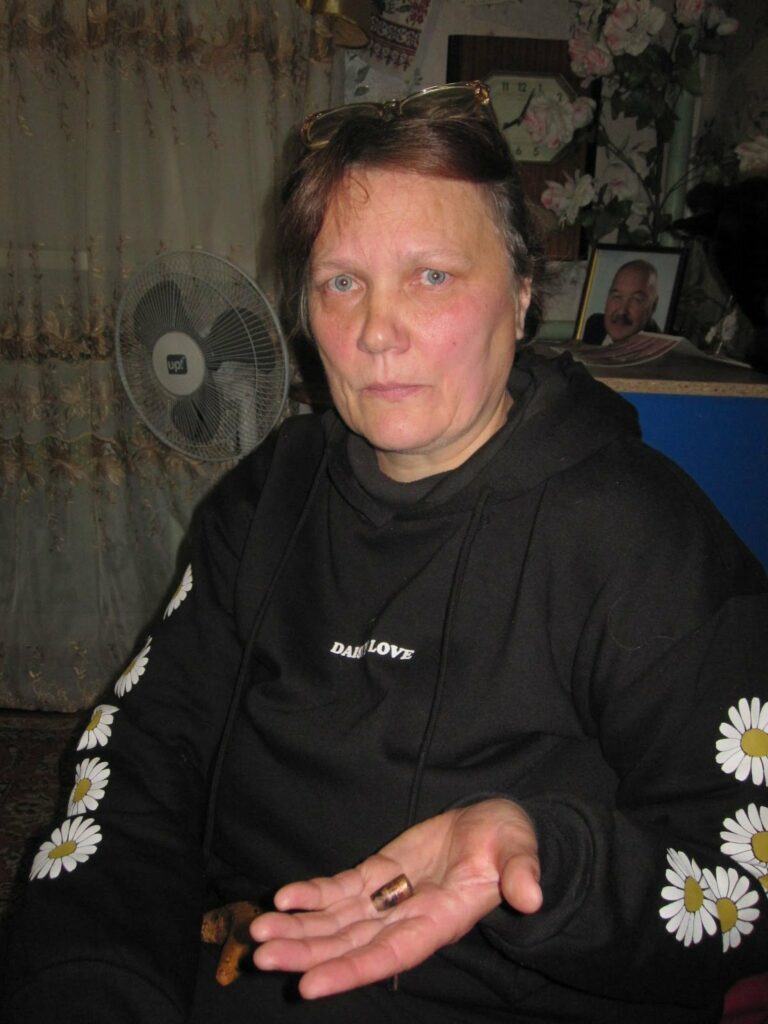
Kuvechychi, like other villages around, was captured in the first days of the war. So, Antonina Hryhorivna Skreka had to solve a dilemma: to take her husband Mykola for an urgently needed hemodialysis procedure to Chernihiv under fire or leave him at home (to die in agony). He needed hemodialysis three times a week. The last procedure was on February 26 – a man from a village drove him to Chernihiv.
I read that if toxins are not removed, a person dies from poisoning. Without hemodialysis, a patient will live for a week if the kidneys do not work or two if they still function. Mykola was getting worse because his kidneys did not work well: another day or two, and he wouldn’t have been able to drive. Antonina cannot drive.
On the morning of March 7, they decided to leave, aware of the danger. They hung pieces of white cloth over their Lanos. Antonina also held a large white cloth in her hand, outside the car window. At first, the road to the regional center was quiet and peaceful. When they drove out on the bypass road, no other cars were seen. Near Novyi Bilous the road was blocked by thrown branches. The woman got out of the car to clear the road. The Uragans’ shelling began suddenly. She jumped into the car, which was already shaking from the shelling. Her husband died, and she fell out of the Lanos and was hit by bullets.
The wounded Antonina Skreka lay on the side of the road, shocked with pain. She was holding tight to a blood-soaked white piece. She thought one of the bullets had hit the heart and was waiting for her last minute. But it’s on the left, and the unbearable pain was on the right. Antonina does not remember when she opened her eyes and saw strangers. She asked Russian soldiers to kill her, because the fear of lying and slowly dying on the cold ground outweighed her will to live. However, the occupiers did not shoot her, but for some reason took her with them. Only in the evening, they took the half-conscious woman to Lhiv, 15 kilometers from Chernihiv. There were no documents or things with her. She was taken to the house of pensioners Hanna and Vasyl Pinchuk.
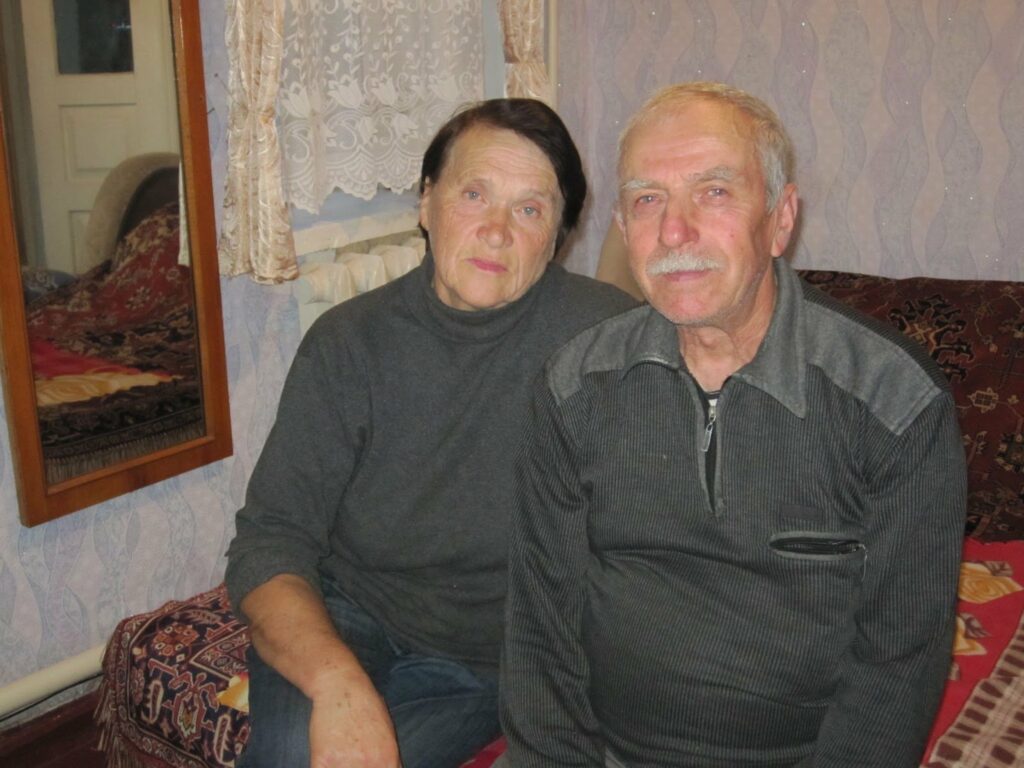
The spouses didn’t lose heart: they cut the blood-soaked torn clothes, pulled her out of the stiffened “shell”. They warmed up water on a stove (there was no electricity or gas in the house). Hanna Dmytrivna washed the woman as best she could. They had no drugs, so they couldn’t ease the wounded woman’s suffering. They did not sleep a wink until morning, and then they called the rescuers.
HER BODY WAS A BLOODY WOUND
“On the morning of March 8, my neighbor and friend Inna Boyko came running to me, very worried. She says: “We must examine a woman. She can die,” says Antonina Klevets. However, a man warned Inna: “If the woman dies, you will be criminally responsible.” We did not hesitate or doubt that we were doing the right thing. Then we didn’t think about consequences or responsibility: we had to save.”
The woman’s body was bloodied and shrapnel-riddled. Abdominal wound. The sternum was punctured, and there was a deep wound with a stuck bullet under the breast. A wound on the back was bleeding. Barely alive, the woman was breathing heavily, for it was twenty-four hours since the car had been fired upon. She needed urgent medical care, but there was no doctor in Lhiv. There was no hope for an ambulance to come to the occupied village. Occupants settled in a house next door. They knew about the wounded woman (as did the whole village) and could come at any moment.
Antonina lost a lot of blood, and her wounds not only bled, but also became infected. Her husband’s death left her in shock – she did not want to live. The veterinarian and the hairdresser were determined and were not going to listen to the wounded woman’s wishes.
Inna Boyko was sure that the woman would be saved. This faith inspired Antonina Klevets, who ran to get the tools. Scalpel, tweezers, scissors, needles, sterile threads, clamps – she took everything. They found some medicines, dressing material, and antiseptics. Tonia operated, Inna assisted her.
SHE PULLED A BULLET OUT OF A WOUND WITH HER BARE HANDS
Together, they carefully examined the woman once again, and treated all the wounds. Tonia examined the whole body. She felt a bullet in a wound under the woman’s breast. The wound was oozing pus.
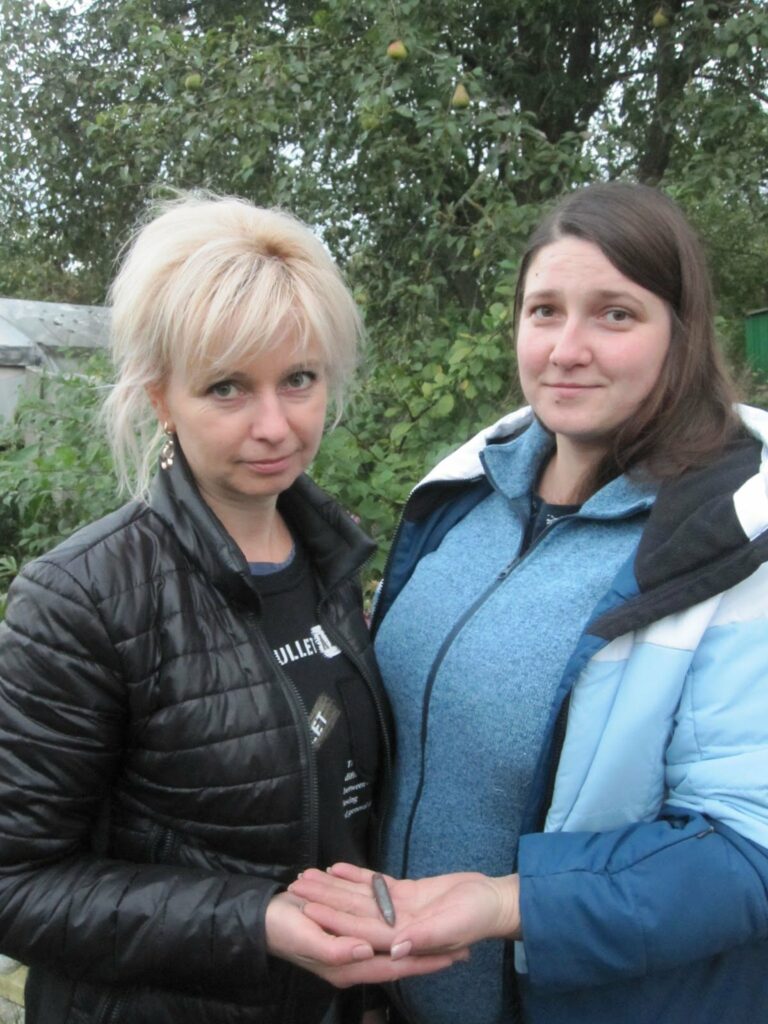
“I understood: if we did not take a bullet out of the wound and did not stitch it up, the wounded would surely die from the infection. I tried to grab it with tweezers once, twice, and a third time, but nothing worked. A bullet was too heavy for the tweezers. I had to “catch” it with my hands. I sanitized them and pulled a bullet out of the wound, though not immediately,” recalls Antonina. “We stitched up the wounds on the stomach and under the breasts, cut off the suppurative skin. The woman, of course, screamed. She was screaming so that the whole village could hear, especially as I cut off the burnt skin and soft tissues. There was nothing to anesthetize her with. Inna put a towel in her mouth, and asked her to squeeze it with her teeth – and that was it. That’s why the wounded woman screamed in pain.”
During the following days, they walked through a hole in the fence because they were afraid to walk along the streets of the occupied village. They used to go to the Pinchuk’s house across the gardens, but sometimes from the porch of a neighboring house the russian military fired shots on the ground just for fun.
Antonina gave injections to the woman and dressed her wounds. They persuaded the woman to get up, eat, and fight for her life. The rescuers didn’t care where she was from and who she was. They weren’t scared about what would happen if anything went wrong. They just rescued the mother, whose children and grandchildren were waiting for her at home. Both said that they would do it again despite the risk and danger.
I ask Tonia if she is always so bold and determined. She smiles and objects: “I am not courageous at all. At first, my hands were shaking, because I had never stitched a human wound up. We had to save a person, and we did it.” They did not count on thanks, did not think about the consequences – they believed that they would save the woman. Currently, both are worried about Antonina Skreka’s health. Because she received multiple shrapnel wounds, and the wound on her back did not heal for a long time (the wound was not treated properly, because the wounded woman could no longer endure the excruciating pain).
OUR SMALL VICTORY
The heroes of the article returned to their daily routine. I immediately recognize Antonina Klevets at the veterinary clinic where I bring my kitty. She strokes it gently, and the cat trustingly looks into her eyes. There is so much kindness in her voice, and grace in her gestures. Tonia is always like a quiet sun: kind, humane, ready to help. She’ll help anybody if needed.
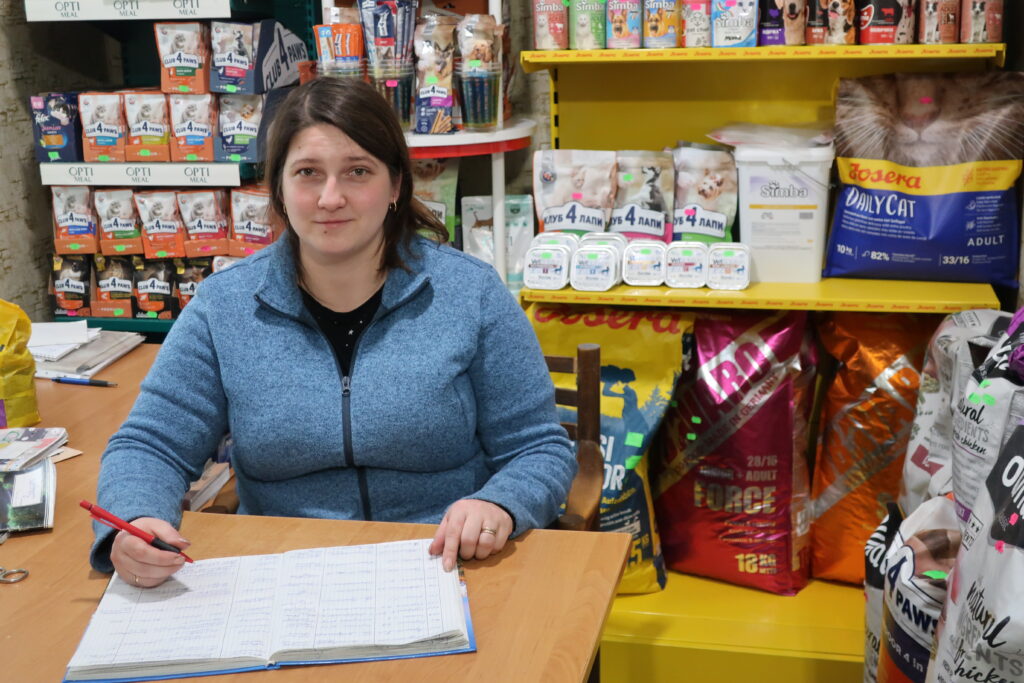
I have also known Inna Boyko for a long time, because the hair salon where she works is not far from my house. Even though she looks fragile, she is brave and courageous inside. Ordinary women without the slightest hint of heroism.
“When everyone knows that something cannot be done, a bully comes and does it. Therefore, I think that Tonia and I are such bullies,” sums up Inna. “When Tonia put the bullet in my hands, it was our small victory.”
Although the hostess of the house, Hanna Dmytrivna Pinchuk, is already elderly, she fed the unexpected guest from a spoon, helped her get out of bed, and nursed her. Her husband helped in everything. Could they refuse to help? They could, but they did not.
PAIN TORTURES ME IN SLEEP
Antonina Skreka had stayed in Lhiv for 21 days before she left the village in a passing car. She walked 4 kilometers from Dovzhyk to her home, although her shrapnel-riddled leg was very painful. When she managed to hobble to Kuvechychi, she did not leave the yard for a month. She couldn’t even get to the hospital, because she was afraid to go that way again. She lives with bullet fragments lodged in her legs and back, as well as with burning memories.
More than eight months have passed since the tragic event. But Antonina Hryhorivna, as she admits in a telephone conversation, finds it increasingly difficult to remember and talk about her experiences: her husband’s death, her injuries, fear and despair. Pain – physical and mental – comes when she sleeps. In daytime, the woman does household chores, looks for “something to be busy with” (she made trench candles for the defenders). At night, she is haunted by thoughts: did they do the right thing by deciding to leave (although there was no other way out)? Her soul and heart are full of gratitude to everyone who saved her.
“I am a simple woman. I did not think there may be so many kind people who, risking their lives, would provide help to a person they had never met. A low bow to all people, the whole village,” Antonina Hryhorivna will say on the air of “Suspilne Chernihiv”. She will say it soulfully, sincerely and simply.
Photos by Olena Hobanova and the author
Olha Cherniakova
19.11.2022
The material was created under the joint project of Ukraine Crisis Media Center and the Estonian Center for International Development with the financial support of the US Embassy in Kyiv and the Ministry of Foreign Affairs of Estonia.

